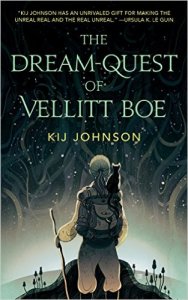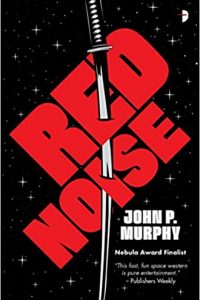Gary K. Wolfe reviews Kij Johnson
The Dream Quest of Vellitt Boe, Kij Johnson (Tor.com 978-0-7653-9141-4, $14.99, 176pp, tp; -8651-9,$2.99, eb) August 2016.
 Apparently, it’s time to deal with The Lovecraft Problem – and not just with the question of whether the World Fantasy Award ought to be represented with a weapons-grade Gahan Wilson cudgel that looks vaguely like an oversized Monopoly token. Last year saw Daryl Gregory repurposing Lovecraftiana for YA in Harrison Squared, and already this year we’ve seen Victor LaValle’s The Ballad of Black Tom and Matt Ruff’s Lovecraft Country, both of which set out to undermine Lovecraft’s notorious racism by effectively using his own eldritch inventions against him. Now here comes the ever-inventive Kij Johnson with The Dream-Quest of Vellitt Boe, which among other things addresses the almost complete absence of women in HPL’s tales – and in particular The Dream-Quest of Unknown Kadath, whose plot it inverts in ingenious ways without abandoning the various horrors, subterranean caverns, elder gods, and other paraphernalia that continue to make Lovecraft appealing, even to many readers who are well aware that in his worldview they would almost certainly be among the missing or the despised. It’s that appeal which is the real Problem – the realization that, for all his cultural offenses and baroquely hypertrophic prose, he was pretty effective at what he did, and much modern horror fiction remains in his shadow.
Apparently, it’s time to deal with The Lovecraft Problem – and not just with the question of whether the World Fantasy Award ought to be represented with a weapons-grade Gahan Wilson cudgel that looks vaguely like an oversized Monopoly token. Last year saw Daryl Gregory repurposing Lovecraftiana for YA in Harrison Squared, and already this year we’ve seen Victor LaValle’s The Ballad of Black Tom and Matt Ruff’s Lovecraft Country, both of which set out to undermine Lovecraft’s notorious racism by effectively using his own eldritch inventions against him. Now here comes the ever-inventive Kij Johnson with The Dream-Quest of Vellitt Boe, which among other things addresses the almost complete absence of women in HPL’s tales – and in particular The Dream-Quest of Unknown Kadath, whose plot it inverts in ingenious ways without abandoning the various horrors, subterranean caverns, elder gods, and other paraphernalia that continue to make Lovecraft appealing, even to many readers who are well aware that in his worldview they would almost certainly be among the missing or the despised. It’s that appeal which is the real Problem – the realization that, for all his cultural offenses and baroquely hypertrophic prose, he was pretty effective at what he did, and much modern horror fiction remains in his shadow.
I was not, like Johnson says she was, among those who were particularly enamored of The Dream-Quest of Unknown Kadath, which always seemed to me to be Lovecraft revisiting Dunsany with some of the same blunt literalness with which Mel Gibson revisited the Gospels, but it’s possible, along with the other Randolph Carter tales, that it’s as close as he came to genuine quest-fantasy. Johnson appreciated it enough to retain many of Lovecraft’s inventions, including those creepy caverns and those various monsters that sound like discontinued breakfast cereals – Zoogs, Gugs, Ghasts, etc. But his Ulthar here becomes a women’s college struggling to survive in a vaguely medieval University (subjects include Ancient Sarnathian and Chymical Studies) already skeptical of women’s education. The immediate crisis is that one of the students, Clarie Jurat, has run off with her boyfriend. Since her father is a trustee of the University, and since such a lapse of decorum might threaten the very existence of the women’s college, math professor Vellitt Boe sets out to track her down – but that task becomes more complicated when she learns they have absconded to ‘‘the waking world.’’
Apart from featuring a professional woman as a protagonist – and using the frame to explore the myriad struggles of an academic woman’s life – this is the first and perhaps most ingenious of Johnson’s reversals. Whereas Lovecraft’s Randolph Carter had to enter the world of dreams to complete his quest, Vellitt Boe has to find her way out of the dreamworld – the Six Kingdoms – that is her home. Accompanied by an uninvited but persistent black cat, she sets out through a pastoral landscape of farms and villages, but this soon gives way to scary forests and wastelands inhabited by the aforementioned zoogs and gugs and ghouls. But before she can obtain a key to the Upper Gate, she has to divert her quest to the distant Ilek-Vad, where she seeks the assistance of her old friend Randolph Carter, who has become king there and whose attitudes don’t seem to have evolved much beyond Lovecraft’s own portrayal (he explains to her that ‘‘women don’t dream large dreams,’’ which is why Vellitt has never met a waking world woman). He provides her with an escort, but it’s Vellitt’s own harrowing underworld journey that finally gives the novella a convincing heroic dimension, along with a sharply insightful account of Vellitt’s own self-exploration and a solid dose of that odd mix of visceral horror and mythic vision that was the source of Lovecraft’s power. Does Vellitt Boe make it to the waking world and save her college by persuading Clarie to return home? With Johnson, such questions are never quite that simple, but the story’s brilliant denouement may be its most subversive aspect of all.





